Can Pet Birds Safely Eat Watermelon? A Complete Guide
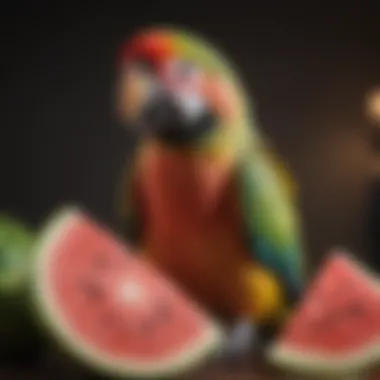

Intro
The prospect of supplying your pet birds with diverse dietary options often stirs interest among avian enthusiasts. Many owners often inquire about incorporating fruits, particularly watermelon, into their birds' nutritional regimen. Watermelon is a fruit that many people enjoy for its hydration and sweetness. However, before introducing this popular fruit to feathery companions, it is crucial to understand both its benefits and potential risks.
Birds require a diet meticulously crafted to cater to their specific species-driven needs, and not all foods appreciated by humans align with these dietary requirements. This article intends to inform bird parents about the advantages and concerns surrounding watermelon for birds, enriching their understanding of avian nutrition. Each detail contributes to the broader discourse about the well-being of pet birds, thereby allowing for thoughtfulness in caring practices.
Care Tips
While considering dietary additions like watermelon, good husbandry practices must also be taken into account. Proper care ensures optimal health and well-being for your pet birds.
Daily Care Routines
Establishing a routine can be beneficial for both the bird and the owner. Bird owners should prioritize feeding fresh food, including vegetables and fruits like watermelon, daily. Hydration plays an equal role; clean water must always be available. Moreover, monitoring the bird's eating habits helps one discern any potential changes in dietary tolerance or preferences.
Cage Setup and Maintenance
The environment plays a critical role in the overall health of birds. A suitable cage size that allows freedom of movement is necessary. As for watermelon and other perishables, these should be introduced in a manner that does not disrupt gravel paths and playing space. Thoroughly cleaning the cage is crucial to prevent mold, which can arise from leftover fruits and vegetables.
Hygiene and Cleaning Practices
Regular cleaning of food dishes is essential. Keeping fruit serving areas clean helps deter pests, unwanted bacteria, and spoilage. Fecal matter can harshly impact health, so a thorough clean at least on weekly basis is advised.
Seasonal Care Adjustments
Birds react differently to temperature fluctuations. In hotter months, introducing cold watermelon can become a refreshing treat. However, consider offering smaller portions to avoid fermentation that can lead to stomach upset. Understanding seasonal needs aids in providing a comfortable habitat for your birds.
Behavioral Insights
Understanding the behavioral cues provided by birds is vital when introducing new foods like watermelon.
Understanding Bird Body Language
Body language serves as a primary form of communication among birds. Flicks of the wings and the posture can indicate excitement or displeasure toward new foods. Observing these may guide further interactions with watermelon offerings.
Common Behavioral Issues and Solutions
Refusal to eat a new food may surface as a behavioral concern. This does not imply complete rejection of the food; sometimes it shows that birds prefer time to adapt to changes. Easing into new food over a gradual period can take pressure away.
Positive Reinforcement Techniques
To encourage a pet bird to try watermelon, include it alongside their regular diet while rewarding curiosity with verbal praise and increments. Accepting small bites can elevate the experience.
Social Interaction Needs
Birds, as social creatures, thrive on interaction. Offering them fruits enriches social engagement—consider sharing small bites during playtime or when bird companions are active.
“Feeling safe in an environment leads to exploring varied food choices, enhancing their diets effectively.”
Nutrition Guides
A rich understanding of nutrition aids in enhancing daily dietary practices. Knowledgeable avian owners set their birds on journeys to better overall health.
Essential Diet Components
In avian diets, seeds predominantly serve as staples; however, they often lack crucial vitamins and minerals. Fruits provide hydration and essential nutrients. Including watermelon can introduce additional vitamins A and C, both pivotal for your pet's health.
Safe and Toxic Foods
While many fruits are safe, a firm grasp on safe versus potentially poisonous foods is essential. Foods to avoid include avocado and chocolate, as toxicity varies greatly among birds.
Supplements and Treats
Consider incorporating generalized nutritional supplements tailored to aspects lacking in specific diets. Treats can consist of various seed combinations combined with diluted nutraceuticals focused on mood, energy, and overall health.
Feeding Strategies for Different Species
Dietary variety must resonate with bird species. Parrots, for example, benefit widely from mixed diets incorporating fruits, whereas finches may consume seeds mixed with small berry pieces. Tailoring watermelon portions to sympathetic sizes based on species lends a precise edge to introducing new items.
Wellness and Health
Overall well-being encompasses regular check-ups alongside healthy diets. Owners should partner with a veterinary professional to ensure appetites correlate with avian frequency of illness.
Routine Health Checkups
Routines should advocate for semi-annual health evaluations. Fishy bird moods may illuminate undisclosed health issues, linking registers of breathing or weight depreciation.

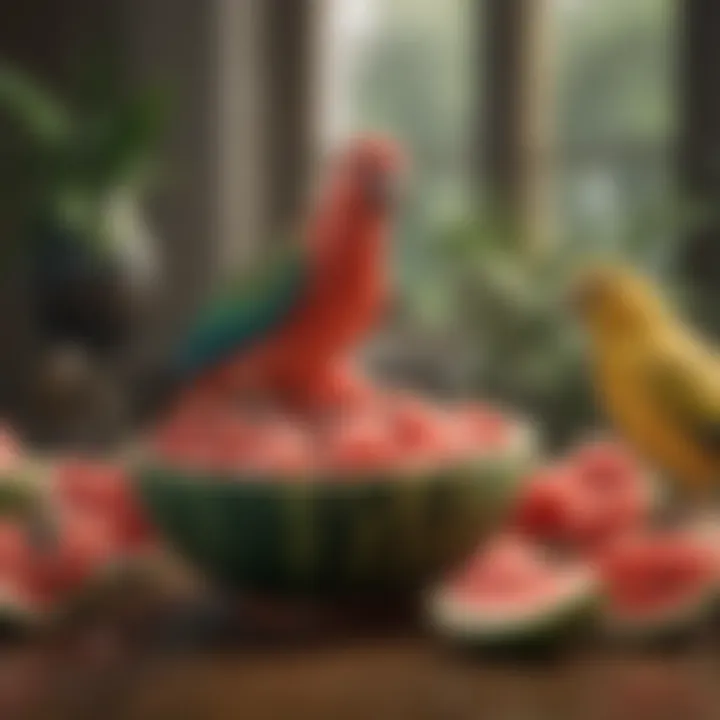
Identifying Symptoms of Illness
Important symptoms include lethargy, feather loss, or unusual droppings. Check regularly to ensure vibrant behavior; referring to professionals helps diagnose conditions early.
Preventative Care and Vaccinations
Vaccinations hold pivotal suppression powers over avian ailments. Getting guidance on seasonal vaccinations from a pet avian veterinary expert diminishes risks involved such as feather infections or transmissible viruses.
Mental and Emotional Well-being
Fulfilling standard cognitive engagement elevates positivity. Birds must have a resting ground, alongside social interactions, boost morale and mitigate anxiety.
Enriching Activities
Combining a nutritious approach with entertaining elements bolsters a stimulating environment beneficial for mental sharpness.
Toys and Playtime Ideas
Introduce amusements. For example, hanging manipulatable toys or foraging aids not only enthrall but cogently compete for any boredom-inducing aspects.
Training and Tricks
Encouraging activity sessions through understanding their trainable patterns brings notable rewards. Pay attention to common tricks that keep them engaged.
Outdoor Activities and Interaction
If circumstances allow, bringing birds outside cultivates exposure beneficial for their spirits. Close monitoring stands as paramount during exploration periods.
DIY Projects for Mental Stimulation
Develop simple projects to develop interpersonal creativity among your birds—engaging skill-building aids reinforce interaction while complementing enrichment initiatives.
Understanding the Avian Diet
Understanding the dietary needs of avian friends lays a crucial groundwork for healthy pet ownership. Birds have distinct nutritional requirements which differ considerably from what typical domestic animals require. Helping bird owners grasp these needs enhances their ability to provide a balanced diet that suits their pets' unique bodies. This article aims to delve deeper into bird nutrition and how watermelon fits into this larger framework.
Basic Principles of Bird Nutrition
Bird nutrition relies on several basic principles. First, it is important to recognize that birds require a mix of proteins, carbohydrates, vitamins, and minerals. Proteins support feather development and tissue repair. Fresh fruits and vegetables enrich a bird's diet with vitamins and fiber. Additionally, seeds and grains provide necessary calories and energy.
Here are some essential components:
- Proteins: Sources such as legumes, eggs, and nuts are critical. They assist in growth and maintenance.
- Carbohydrates: Grains serve as primary energy sources.
- Vitamins and Minerals: Notably, Vitamin A, D, and calcium are essential, impacting overall health.
Note: Maintaining a balance of these elements breeds healthier, more active birds
Importance of Variety in Diet
A varied diet plays an essential role in ensuring that birds receive all necessary nutrients. Different fruits, vegetables, seeds, and grains contribute unique vitamins and minerals that aid in overall wellness. Relying solely on a single food type can lead to nutritional deficiencies. For example, vegetables are high in fiber, while fruits like watermelon can deliver hydration and antioxidants.
Conclusion: Mixing foods offers not only nutritional benefits but also mental stimulation for birds. They often enjoy diverse tastes and textures. Thus, ensuring a wide-ranging diet helps keep pet birds healthy and satisfied.
Nutritional Composition of Watermelon
Understanding the nutritional composition of watermelon is essential for bird owners considering this fruit as part of their pets' diets. Watermelon is low in calories and comprises mainly water, which offers hydration, particularly in warm climates. It also contains vitamins and minerals that can supplement a bird's diet in beneficial ways. However, the balance of nutrients and the potential risks associated with the natural sugars found in watermelon require careful consideration. Below, we break down the specific components that define watermelon as a fruit deemed appropriate for many pet birds, while also addressing some caveats.
Vitamins and Minerals in Watermelon
Watermelon is rich in certain vitamins and minerals that can be beneficial to birds. Notably, it provides Vitamin C, which plays a critical role in supporting the immune system in pets. Birds who have adequate Vitamin C in their diets can be less susceptible to infections. This vitamin is also involved in collagen formation, assisting in the overall health of feathers and skin.
In addition to Vitamin C, watermelon contains potassium and magnesium, both of which contribute to muscle function and cardiovascular health. Potassium helps to maintain proper fluid balance in cells, while magnesium plays a role in numerous biochemical reactions in the body.
Feeding your bird watermelon can help provide these essential nutrients, making it a potentially worthwhile addition. The exact needs, however, will vary significantly among different species of birds tune so it's important to consider the specific dietary needs of your pet.
Hydration and Sugar Content
One of the most alluring aspects of watermelon is its high-water content, which ranges about 92%. This quality is particularly beneficial when birds are exposed to dry, hot environments. Adequate hydration is vital for avian health as it contributes to healthy bodily functions and can affect behavior and energy levels.
However, despite these hydration benefits, watermelon also contains natural sugars. Each serving of watermelon has sugar levels that could potentially lead to overconsumption if not moderated. Birds may be more prone to obesity and related health issues if high-sugar content treats are given in excessive amounts.
This necessitates careful portioning. Too much watermelon can ultimately disrupt a balanced diet, dominating better nutrient-rich options that should feature in a pencil own mix of seeds, nuts, fruits, and vegetables.
Potential Benefits of Watermelon for Birds
The topic of potential benefits of watermelon for birds is crucial in understanding how this fruit can enrich a bird’s diet. Watermelon is not only a refreshing snack; it also offers several nutritional advantages that can positively influence a bird's health. Given the variety of pet bird species and their specific dietary needs, it's important to explore these benefits thoroughly.
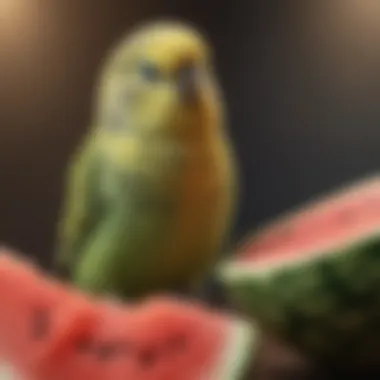
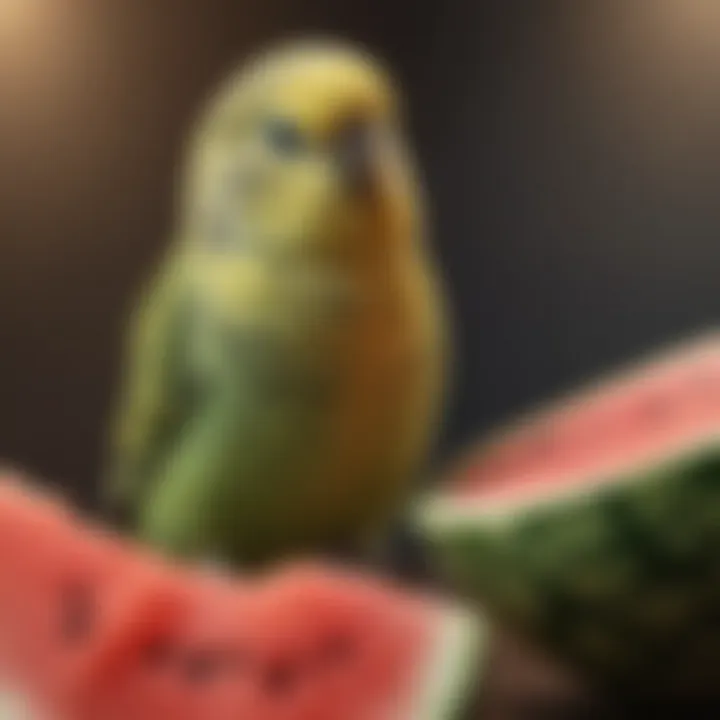
Hydration Benefits in Hot Weather
Birds are susceptible to dehydration, especially during hotter months. Watermelon has a high water content, around 90%, making it an excellent option for hydration. Keeping a bird hydrated is vital for its overall well-being. For instance, during the summer heat, the extra fluids from watermelon can help pet birds maintain their health, avoiding potential issues like heat stress.
Hydrated birds are happier birds. When their bodies are well-hydrated, they exhibit improved activity levels and behavioral balance. Including watermelon occasionally in their diet can provide essential moisture. However, moderation is necessary since too much watermelon can lead to diarrhea due to excess water.
Vitamins Supporting Immune Function
Besides hydration, watermelon is rich in vitamins that contribute significantly to a bird's immune health. Key vitamins present in watermelon include Vitamin A, Vitamin C, and several B vitamins. Each plays an important role:
- Vitamin A: Supports healthy vision and skin health, essential for birds, particularly for species that are prone to vision loss over time.
- Vitamin C: Acts as an antioxidant that helps in reducing the effects of stress and enhancing overall immunity.
- B Vitamins: These are important for energy production and metabolism. They also aid in maintaining a healthy feather condition.
Overall, proper incorporation of watermelon into a bird's diet may bolster its immunological functions, reflecting better complaint of environmental changes and stresses. In summary, watermelon is not merely a tasty treat but also a practical way to support hydration and immune strength among pet birds.
Risks of Feeding Watermelon to Birds
Watermelon may seem like a safe and enjoyable treat for pet birds, but several risks complicate this view. It is essential for bird owners to recognize these potential issues. Understanding these risks can help owners make informed decisions about their birds' dietary inclusion. An imbalance in a bird's diet due to potential overdose could lead to different health complications. Therefore, careful consideration when it comes to overall fruit consumption including watermelon will ensure birds' well-being.
Sugar Overload and its Consequences
One of the most pressing concerns in giving watermelon to birds is the sugar content. While watermelon is a Hydrating fruit, it also contains a relatively high level of sugar. A small portion might not seem harmful but repeated and excessive feeding can lead to sugar overload. Birds already have a small body mass, leading to quicker implications if sugar intake is too high.
Excessive sugar can lead to serious health problems, including obesity, liver disease, and other metabolic issues. Birds are not able to tolerate sugar in large amounts as humans can. It’s crucial to observe the proportions and track how often watermelon is added to their diet. Uncontrolled consumption without moderation can push their usability to an unhealthy state, impacting their and hence it should be categorized as an occasional treat rather than a regular staple.
Digestive Issues to Consider
Another matter worth addressing is the possibility of digestive disturbance when feeding watermelon to birds. Due to their delicate digestive systems, birds can react to new foods incorrectly or in various ways. Watermelon’s high water content, while beneficial during warm months, could lead to diarrhea or other issues if consumed too often or in excessive amounts. It can latex the digestive response over time.
Apart from the potential for diarrhea, there may also be concerns of bloating or an upset stomach. Before introducing watermelon into the birds' diet, it is wise to watch out for adverse reactions. If any digestive issues appear, reconsider the frequency and amounts being given. Testing one small piece at a time as an identifier will help gauge how their system handles larger volumes if they respond well initially.
Pesticide Residue as a Concern
While analyzing the risks of watermelon consumption for birds, pesticide residue arises as a significant point. Melons, in general, can carry pesticide residues, which can be harmful if ingested. Birds, being more sensitive to toxics than other pets due to their size and inherent differences, can experience adverse reactions from consuming pesticide-laden fruits.
To reduce any potential risks from pesticides, it is advisable to wash the watermelon thoroughly. Better yet, purchasing organic watermelon is a more cautious alternative. The largest safety concerns originate around the skin and outer part of the fruit. Since birds are inclined to nibble all parts, removing the skin and offering the inner flesh after inspection reduces risks significantly. Paying attention to these details ensures not only safe but a more pleasurable eating experience for the bird.
Owners should avoid feeding birds anything that could potentially harm them. Observing any patterns in behavior linked to watermelon is the key to ensuring a healthy life for our little feathered companions.
Species-Specific Dietary Considerations
Diving into the realm of pet bird diets, one must consider species-specific dietary considerations. Not all birds have the same nutritional needs. Factors such as species variation influence how they handle different foods, including watermelon. To provide the best care for pet birds, understanding these differences is important. Each species has unique dietary requirements, and what may be suitable for one may not be good for another.
Popular Pet Bird Species and their Needs
Birds that are often kept as pets represent a variety of species. Each has its own dietary preferences and nutritional needs. For instance, parakeets may thrive with a balanced diet of seeds and greens. However, they also enjoy fruits in moderation. Adding watermelon can provide not just hydration but nutrition as well.
Cockatiels, on the other hand, tend to favor seeds and also require ample calcium to support their bone structure. A small amount of watermelon might offer a flavor change or alternative hydration source. In contrast, lovebirds have a more concentrated diet focused on seeds and cannot process high sugar content well. For them, watermelon requires caution.
To ensure that their nutritional needs are met, pet owners should consider these points:
- Identify taper available for each species.
- Incorporate a variety of fruits cautiously.
- Regularly consult avian nutritional resources.
Understanding these nuances helps owners tailor their feeding strategies while preventing any adverse effects associated with improper diets.
Assessing Tolerance among Different Species
Different species also exhibit varying levels of tolerance to new foods. Observing how each reacts to watermelon is crucial.
Some species may adapt easily, while others might show reluctance or discomfort. The reactions may vary from mild disinterest to digestive upset. Identifying these early signs can prevent potential health issues:
- Digestive reaction: Watch for changes in droppings or behavior after consuming new food.
- Taste preference: Birds might simply not enjoy certain tastes.
- Allergic reactions: Though rare, it’s important to monitor for any signs of allergies.
Interactions between ingredient composition of watermelon and a bird's digestive system can be telling. Taking the time to properly assess how individual species respond to watermelon can ensure long-lasting health for these semi-delicate creatures.
As such, integrating watermelon should be evaluated against the backdrop of specific bird species adopted in a household. Consulting with an avian specialist can refine the diet for suitability based on educational understanding of bird needs.
Feeding Guidelines for Watermelon
Feeding watermelon to pet birds presents a nuanced took at incorporating this fruit into their diets safely. It's crutcial to follow appropriate guidelines to maximize benefits while minimizing risks. Birds may have different tolerances and reactions, so attention to portion sizes and preparation methods is necessary. Additionally, watermelons moet much moisture and nutrition, aligning with some birds' natural behaviors. Below are important aspects of feeding watermelon to your avian companions.
Portion Control and Frequency
Control of portion sizes is an important elemento when feeding watermelon to birds. The natural sugar content of watermelon requires moderation. Birds, when given access, may enjoy the fruit, but excessive consumption may lead to health concerns. A small wedge is usually more than sufficient. Consider the following when adding watermelon to your bird's diet:
- Frequency: Every small treat should be given once a week or less to prevent sugar overload.
- Portion Size: Adjust the amount based on your bird's size and diet. Smaller birds may only need a bite-sized piece to enjoy it without overeating.
- Variety is Key: Ensure watermelon serves as part of a larger spectrum of fruits and vegetables.
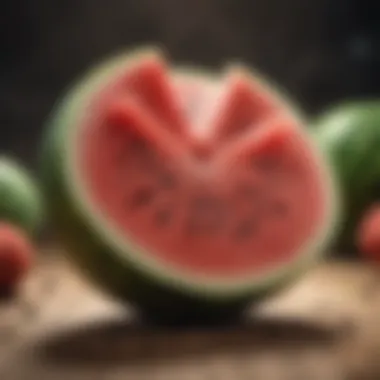
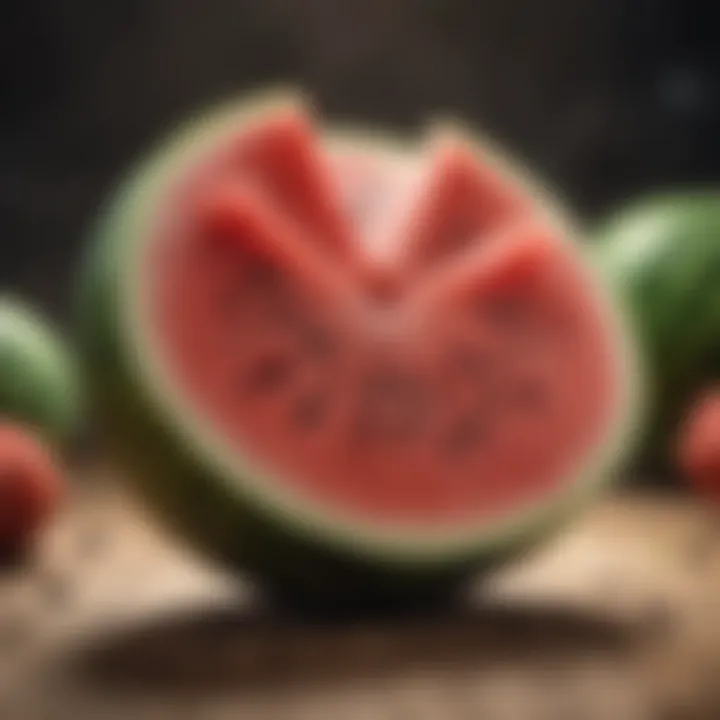
By controlling both portion and frequency, pet bird owners can provide this delightful fruit without compromising their pet's welfare.
Preparation Tips for Safe Serving
Preparing watermelon for your bird requires careful consideration to ensure it is safe and nutritious. Contaminants on fruit must be eliminated, and careful serving is essential. Below are some easy tips for preparing watermelon:
- Washing the Fruit: Always wash the watermelon profusely to remove pesticide residues and dirt.
- Removing Seeds: Be sure to remove any seeds present. Larger seeds can present choking hazards.
- Handling with Clean Hands: Always wash your hands before handling the fruit to prevent contaminating it with bacteria.
- Cut into Smaller Pieces: Slice watermelons into manageable pieces that your bird can easily grasp, enhancing its eating experience.
By following these preparation guidelines, bird owners enhance the safety of watermelon serving and aviod undesirable complications.
Observing Bird Reactions to New Foods
Observing the reactions of pet birds to new foods is significant for any bird owner aiming to provide a secure and nutritious diet. Birds, like all pets, can experience varying reactions to ingredients they have not encountered before. The way they respond to new items on their menu can indicate whether a food is suitable or poses a possible health risk.
When introducing watermelon or any new food to birds' diets, paying close attention is critical. Owners should take note of both immediate and long-term responses to the food. This approach helps identify any potential health concerns that may arise quickly.
Signs of Allergic Reactions
Just like humans, birds can develop allergic reactions to certain foods. Early diagnosis of these reactions can prevent complications. Owners should look for signs that could indicate an allergic response. Common symptoms to observe include:
- Feather picking or abnormal feather loss: This might point to skin irritation or stress likely triggered by a food allergy.
- Vomiting or diarrhea: These gastrointestinal responses are clear indicators that a bird’s digestive system did not accept the new food.
- Swelling or redness around the eyes, beak, or feet: Inflammation in these areas could signal an allergic response, which is often visible.
- Unusual lethargy or changes in activity level: A lack of energy can happen if a bird feels unwell after trying something new.
Observing these symptoms is vital for timely intervention. If signs are noticed, it then becomes essential to discontinue that particular food and consult a vet for expert guidance.
Behavioral Changes Post-Consumption
Besides allergies, some birds may have behavioral changes after eating watermelon or other new foods. Attention to these shifts can provide insight into their overall health and comfort. Common behavioral changes include:
- Increased foraging behavior: Consumption of watermelon may generate excitement, leading birds to engage in more active scavenging for food.
- Withdrawal or hiding: A bird that previously socialized may withdraw or seem disinterested, indicating discomfort or health issues post-consumption.
- Vocalization changes: Notice how vocal patterns may alter; excessive whining or silence can signify problems.
- Changes in climbing or flight patterns: If a bird appears off-balance or hesitates in its movement after eating, these could reflect underlying health matters.
Noting these reactions can help in gauging tolerance levels of certain foods, creating awareness of acceptable dietary options for specific species.
As a part of good husbandry, empowering owners with the knowledge to observe and act accordingly ensures that feeding watermelon and any other novel foods align with their pet's wellbeing.
Expert Opinions on Avian Diets
The field of avian diets has developed significantly, and expert opinions play a crucial role in shaping our understanding of what is best for pet birds. Feeding practices can make a notable difference in the health and longevity of these animals. Knowledge from veterinarians and nutritional specialists is invaluable for bird owners seeking to enrich their pets' diets with variety and nutrition.
A significant part of species-specific health lies in the foundation of dietary choices. The inclusion of fruits, like watermelon, often divides opinions among professionals due to the balance required between nutritional benefits and potential risks. Both veterinarians and nutritional experts highlight the factors that bird owners should consider when introducing new foods into their pets' diets.
Veterinarian Insights on Fruit Inclusion
To enhance the well-being of birds, veterinarians address the nuances tied with adding fruits like watermelon to the avian diet. They commonly emphasize the importance of moderation. Watermelon, while hydrating, contains considerable sugars that can lead to obesity and various health concerns in small birds.
Vets often suggest paying close attention to the size and activity level of a bird before incorporating any sugary treat. The following points summarize critical insights from veterinarians regarding fruit inclusion:
- Moderation is Key: Smaller portions will avoid excessive sugar intake.
- Variety Matters: Different fruits provide a range of vitamins and minerals but should still be introduced slowly.
- Monitor Health Closely: Watch for any signs of discomfort or health changes following the introduction of fruits.
It is essential to focus on the size and species of the bird when serving fruit. For example, small parrots may find a nibble of watermelon enough, while larger breeds might handle a few more bites without adverse effects.
Nutritional Specialists’ Recommendations
Nutritional specialists enhance our understanding of how to incorporate fruits like watermelon into avian diets effectively. They may encourage bird owners to combine fruits with grains, seeds, and vegetables for a balanced diet, ensuring all essential nutrients are provided.
Here are key recommendations to consider:
- Balance with Other Foods: Use watermelon as a treat rather than a staple.
- Nutritional Awareness: Understand that not all fruits offer equal benefits. Watermelon carries essential vitamins like A and C, but some fruits can offer a broader range of nutrients.
- Introduce Gradually: As with most new foods, introducing watermelon should be gradual to observe any negative reactions or preferences.
Culmination: Is Watermelon a Safe Option?
In this exploration of whether pet birds can eat watermelon, we reached a critical juncture. Understanding if watermelon serves as a safe addition to a bird's diet is essential for pet owners who want to ensure their feathered friends are both healthy and satisfied. Many owners might be eager to offer this juicy treat but need to weigh the advantages and potential risks.
Summary of Findings
Watermelon does offer several nutritional benefits. It is rich in water content, providing excellent hydration, especially during warmer months. Along with fluids, watermelon contains vitamins such as vitamin C and a few essential minerals. These nutrients can support overall health and potentially boost the immune system.
However, while introducing watermelon can be beneficial, it is vital to remember the sugar content. Birds may experience negative health effects from consuming too much sugar, leading to complications like obesity and related diseases.
Additionally, it is important to consider the method of preparation. Birds with more specific dietary needs, such as parrots or canaries, may respond differently to this fruit. Each species has unique tolerances, making the assessment of individual reactions paramount.
Here are significant points to note from the findings:
- Hydration Efforts: Watermelon helps keep birds hydrated.
- Vitamins and Minerals: Provides beneficial nutrients for overall health, particularly during hot weather.
- Sugar Risks: Excessive sugar consumption poses health threats like obesity.
- Individual Reactions: Species differences can affect dietary tolerance.
Final Recommendations for Bird Owners
Based on the combination of findings, here are a few key recommendations:
- Moderation is Key: Offer watermelon in small, controlled portions to prevent excess sugar intake.
- Observe Reactions: Monitor your bird's behavior after introducing watermelon. Watch for any signs of distress or allergic reactions.
- Diverse Diet: Watermelon should not replace other parts of a balanced diet. Offer a range of foods, including seeds, pellets, and other fruits in suitable amounts.
- Preparation Tips: Clean and prepare watermelon properly. Remove seeds and rind, serving it in safe chunks, avoiding any additives.
In summary, watermelon can be a safe and festive treat for pet birds when administered cautiously. Many owners will find that their pets enjoy this juicy snack, but attention to individual dietary needs and the overall balance of their diet remains paramount. As always, consulting with an avian veterinarian can provide personalized pointers and enhance the well-being of your pet bird.















